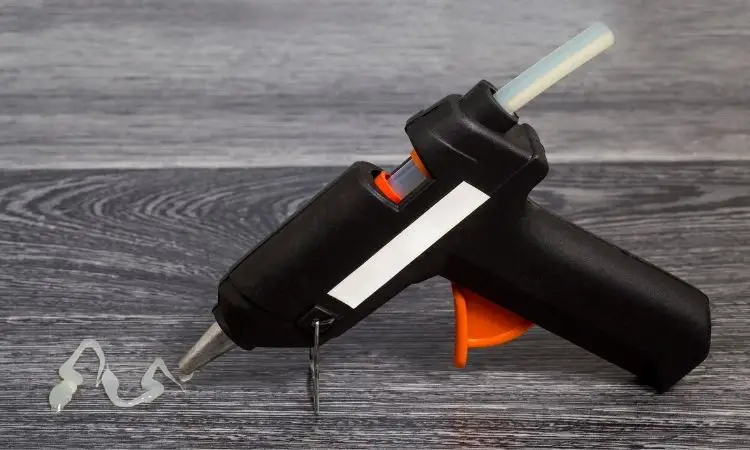
Hot glue is an adhesive found at most craft stores and used for various projects. It is more powerful, especially when compared to other DIY adhesives like super or white glue.
For fishkeepers, hot gun glue is a readily available material that they can use to provide quick fixes in the fish tanks.
As with any other item (such as cleaning reagents), we ask, ” Can you use hot glue in an Aquarium?”
The glue from hot glue guns is perfectly safe for aquarium use. They contain solvents but no toxic chemicals or dangerous elements that make them unsafe. Hot glue is a good option because it dries quickly and forms a strong bond.
However, it is not a permanent solution and will eventually break down in sunlight. If you’re only using it as a temporary fix, keep an eye on it and replace it when needed!

Glue sticks tend to be slightly better than cartridges because cartridge gun glue occasionally contains tiny amounts of metal shavings as fillers which can pollute your water supply if they come loose.
If you’re concerned, you can always test a small amount of the glue in a glass jar or other container before using it on your tank.
If there are no adverse reactions or negative results from your test kit after a few days, it should be safe to use in your aquarium.
Just make sure that the glue is completely dry before adding any water!
Does Hot Glue Withstand Water?
The answer to this question depends on the type of hot glue used. Urethane-based hot glues are generally waterproof and can be used in projects exposed to water.
On the other hand, rubber-based hot glues are not waterproof and should not be used in projects exposed to water.
If you are unsure whether your hot glue is waterproof, it is best to test it before using it in a project exposed to water.
Apply a small amount of hot glue to a piece of paper and then let it dry. Once the glue is dry, spray the paper with water.
If the glue does not dissolve or peel off, it is waterproof and can be used in projects exposed to water. If the glue dissolves or peels off, then it is not waterproof.
What Glue Can You Use in an Aquarium?

There are a variety of glues that can be used in an aquarium. Some popular choices include silicone sealant, aquarium-safe epoxy, and super glue.
Choosing an adhesive that will not harm the fish or other inhabitants of the aquarium is vital.
Silicone Sealant
Silicone sealant is a good choice for underwater repairs because it is durable and flexible. You can use it to attach decorations, repair leaks, and even bond two pieces of glass.
However, it would be best not to use it to hold live plants in place because it can damage their roots.
Aquarium-safe Epoxy
Aquarium-safe epoxy is another option for repairing leaks or bonding materials together. Epoxy is a group of compounds consisting of two or more resins linked together by an intervening hardener.
It can be used as a waterproof adhesive, protective caulk, or reinforcing material.
Epoxy is not water-soluble. It forms a thick coating that resists moisture, chemicals, and corrosion when it dries.
Superglue
Superglue can be a good choice for quick repairs because it dries quickly and sets within minutes. However, super glue will eventually wear off, so an aquarium cannot rely solely on this adhesive for long-term repairs.
In addition, some fish may ingest superglue if they try to eat a toy glued into their tank.
If none of these glues are available, household glue can work as long as it is non-toxic and water-resistant.
Household glue can be made safe for an aquarium by applying a second layer over the first sets quickly and is very strong, making it a good choice for projects that need to be completed in one sitting.
To use it in an aquarium, apply it to the surface and let it dry completely before adding water.
No matter what type of glue is chosen, it is essential to read the label and ensure it is safe for use in an aquarium. Some adhesives contain harmful chemicals that can harm fish and other aquatic creatures.
Always test a small glue patch in a hidden tank area before using it on a larger project. If any adverse reactions occur, such as fish becoming lethargic or slime coats developing, discontinue use and seek medical advice.

Jesse is the principal author of this blog. He is an avid fishkeeper with rich experience spanning several years. He is here to share his knowledge and ensure you also have a guiding compass, as he did with his father.